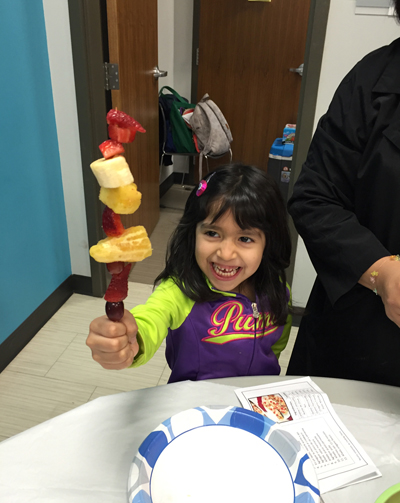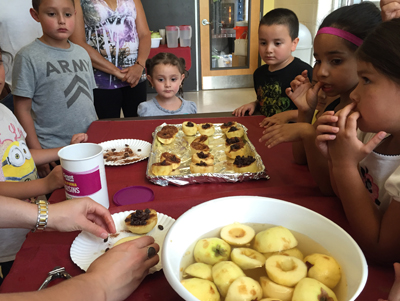The Nashville Collaborative, a partnership between Monroe Carell Jr. Children’s Hospital at Vanderbilt and the Nashville Metropolitan Board of Parks and Recreation, is launching a new program called Teaching Kitchen Outreach.

As the Nashville Collaborative prepares to celebrate its 10th anniversary this summer, the Teaching Kitchen Outreach program will significantly expand free, healthy cooking demonstrations to children at all Metro Parks community centers’ after school programs. Participants must be enrolled in the program. The project expansion is made possible by a local foundation that supports efforts to enhance the lives of families and children.
“Just as a famous philosopher once said, ‘Knowing is not enough.’ One must apply that knowledge. Teaching Kitchens teach valuable, usable skills to children and their families,” said Shari Barkin, MD, MSHS, William K. Warren Foundation Professor of Medicine, director of Pediatric Obesity Research and chief of the Division of General Pediatrics at Children’s Hospital. “Starting early allows children to set healthy habits as their default behavior which can serve them throughout their lives.”
Teaching Kitchens are part of the Nashville Collaborative’s overall mission: to measurably improve child health for chronic disease prevention and reduction of health disparities through sustainable, family-focused programs in Metro Parks community centers.
“The Nashville Collaborative is a wonderful demonstration of the impact of partnerships and ultimately the positive results they have on families who need these valuable skills to fight obesity and a variety of other diet-related illnesses,” said Metro Parks Director Monique Odom.
Teaching Kitchens started with a reach of four sessions per month led by six staff at four community centers in Nashville with 80 children and their families participating. The expanded program will grow the sessions to 50 per month led by 30 staff and master trainers in all 25 Parks community centers to serve more than 1,500 children and their families.
Families that are interested in having their children participate in the Teaching Kitchen Outreach cooking classes should contact their local community center.

Teaching Kitchens can be family-centered or child-centered to help families with children prepare nutritious, affordable meals and snacks to promote healthy eating habits. Types of healthy foods that children learn to prepare include fruit kabobs, chicken taco burgers, baked apples, whole-wheat pizza, bean salad and more.
Studies have shown that eating habits developed during childhood continue into adulthood.
In follow-ups with families, program coordinators found that most participants of the teaching kitchens made the snack or meal at home using the recipes handed out and the cooking techniques demonstrated in the session.
There was also a decrease in the frequency of fried foods and an increase in the frequency of fruits eaten in the week after the session. Some families reported an increase in eating meals together.
Metro Parks has also collected data on cost-effectiveness: a session typically costs about $1.16 per participant.
“Teaching Kitchen sessions focus on what families can do together, young and old, at home any day of the week, in and out of season, to prepare a quick, affordable, tasty and healthy, home-cooked bite to eat,” said Juan Escarfuller, program manager in the Division of General Pediatrics at Children’s Hospital.
The Nashville Collaborative group designs and tests innovative programs, like teaching kitchens, using evidence-based practices, with the goal of helping children be active, maintain a healthy weight and prevent chronic childhood illnesses such as obesity and diabetes. Other examples of programs have included parent-child exercise activities and after-school programs that encourage children to be physically active.
Stevon Neloms, superintendent of Community Programs said, “We’re excited to have expanded Teaching Kitchen programs as an offering in our after-school programming.
“We’re thankful for our partnership with the Nashville Collaborative that helps us make a sustainable impact on health outcomes for young people.”
Metro Parks offers a variety of facilities and programs throughout Davidson County, which includes nearly 16,000 acres of land, 184 parks and 86 miles of greenway. The department’s mission is to sustainably and equitably provide everyone in Nashville with an inviting network of parks and greenways that offer health, wellness and quality of life through recreation, conservation and community.












